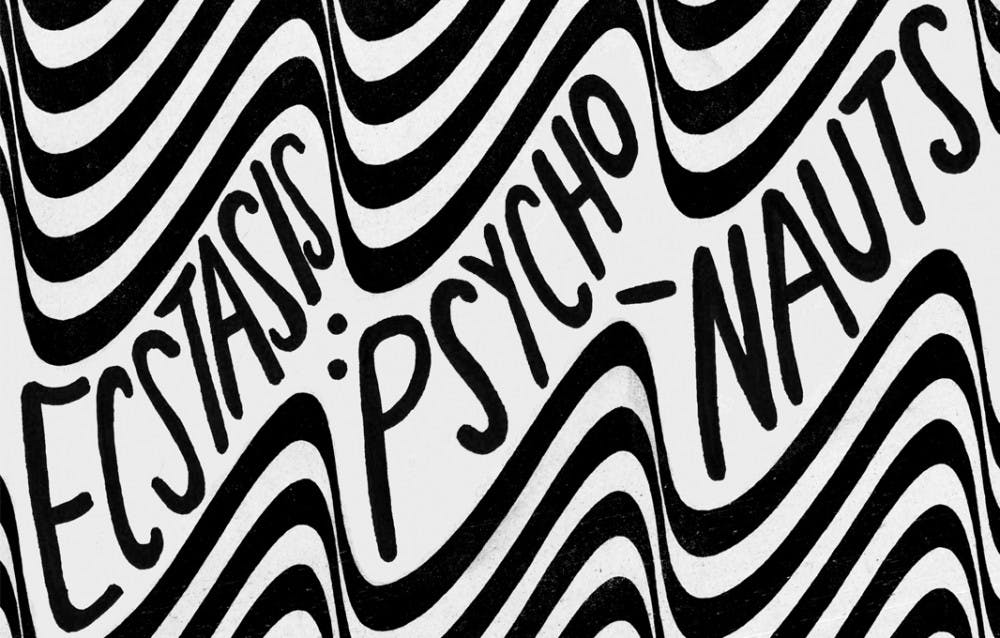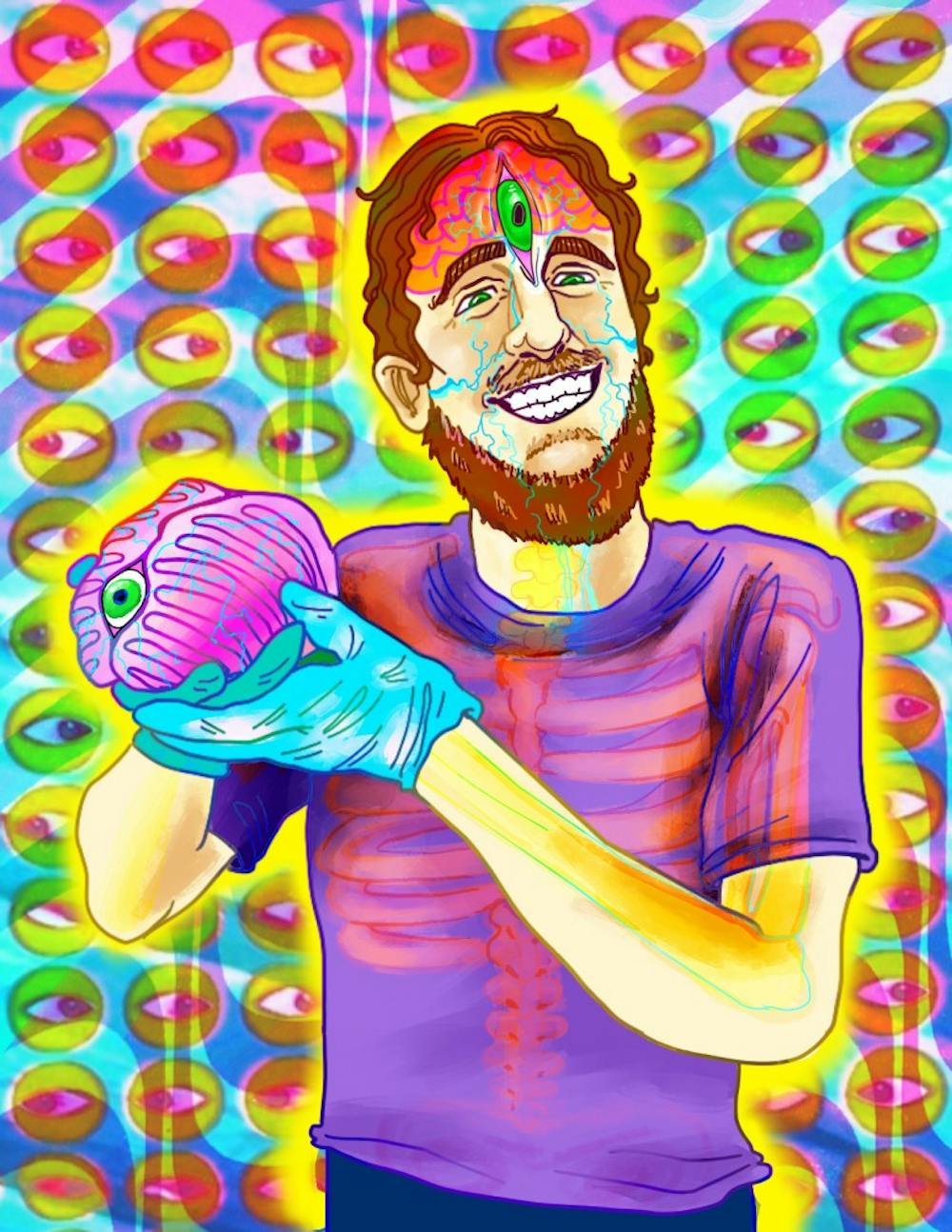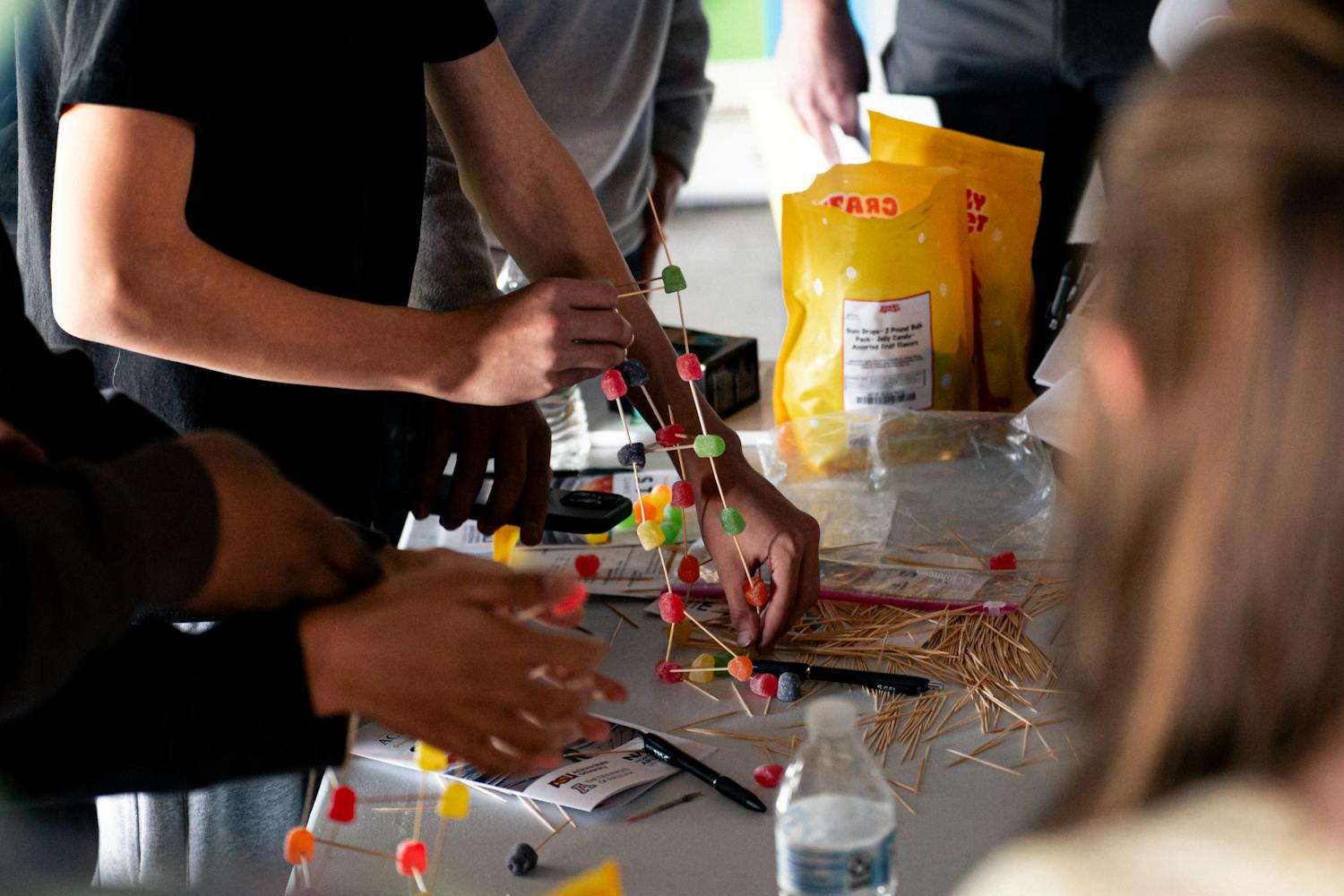Sitting in his philosophy of science class, junior psychology major Derek Espinoza noticed a mushroom tattooed on one of his classmates arms.
“Is that amanita muscaria?” asked Espinoza.
“It is!” replied fellow psychology junior Matthew Broussard.
From this quirky connection on an obscure species of psychoactive mushroom popularized by its cartoonish portrayal in the Mario video game franchise, the two would eventually create what is now called “The Ecstasis Club.” Espinoza now serves as the treasurer, and Broussard is the communications director, along with sustainability junior and event planner Mayan Eartheart.
The trio began the club in the spring of 2018, dedicating its purpose to the study of psychedelic experiences and contemporary research.
“We became friends and started talking about psychedelics and how there was not a forum on campus to be able to talk about people’s experiences, as well as research or really any conversation about altered states,” Espinoza said.
Espinoza was inspired to start the club when he witnessed a woman close to him experience a healing ceremony at the Peyote Way Church of God in Willcox, Arizona. Peyote is a drug derived from the peyote cactus, known for its psychoactive qualities. He said seeing the positive effects this experience had on her everyday life made him think psychedelic drugs should be discussed on a more serious note in the scientific field.
“It set off a cascade of healing in different areas of her life, some of which she did not even realize were issues in her life prior,” Espinoza said. “It changed her life.”
Despite contrary beliefs, the club stresses that it does not promote the use of any legal or illegal drug. It acts as a forum for discussion and research, rather than execution.
The club holds “integration circles” regularly, where anyone is allowed to come in and talk about their experiences seeing life in an altered state. Broussard said those who have extraordinary or transformative experiences due to altered states can feel isolated or alienated in society, and it can be hard for them to share their stories or integrate them into their lives. This is where the club comes in.
“I’m a big acid head,” said a man sitting in on the club's first meeting of the semester, during an open discussion. “I believe life itself is not real.”
Heads around him nodded in agreement. A woman sitting next to him revealed she is a community assistant in one of the dorm buildings. She shared her struggles with the University housing’s anti-drug policy and how it has affected her. She is a medical marijuana cardholder and uses the plant to help cope with anxiety and depression.
The circle began to open up, and philosophical conversations about drug policy started to arise. This mixed with distant chatter about LSD trips and meditation, and it became clear the meetings truly do welcome all types of discussion, no matter how far out.
“By the way, if you know anyone who would be interested in this club, preferably some who are not white males, let them know,” neuroscience graduate student Broc Pagni said, after a quick glance of the room showed there were not many women or people of color in attendance.
Broussard brought the meeting back together and reminded the group once again that, although they always welcome discussion about out-of-body experiences on psychedelics, that is not the main focus of every meeting, as their core values are education, community outreach and integration.
Dropping acid is not the only way to have an out-of-body experience, though. These unique experiences can come from something as simple as playing sports or meditating, Broussard said. Activities like this can put those practicing them into a “flow state,” which is, in other words, a euphoric state.
Flow states are a topic largely discussed during meetings and are often a part of their workshops and activities. One of their workshops titled “Waking Up: An Introduction to Ecstatic Living” features a guest speaker named Syndee Eartheart, who teaches breathing techniques to put those who participate into a supposedly psychedelic state.
When Broussard asked for members who would be interested, hands quickly shot up.
While there is, as Espinoza said, a big cultural shift happening toward the acceptance of the use of psychedelics, there are still many against the legitimacy of these drugs from a scientific standpoint. Both Espinoza and Broussard said they struggled to find support for the research of altered states of consciousness from many professors.
“Going into a scientific field and also studying philosophy, I want to talk about the nature of these altered states of consciousness,” Broussard said. “However, when I talk to my professors or people in my life who may be a little more conservative, they kind of look at it as unimportant or not reality, but for me, it is reality. It’s my experience, and I feel there’s a little alienation that comes from that.”
Broussard said that despite the amount of relevant scientific research he has found on these drugs, professors still have shunned him away.
“Some conservative professors will tell you that there is no literature on it, but when you actually do your own research, you find that that literature is more promising than most of the stuff that we learn in classes,” Broussard said.
The club's current goals are to get a team together to do research on the positive effects of psychedelic drugs and to participate in a conference in early 2019 that hopes to open a discussion between professors and students regarding the topic of drug research.
They are not in this alone, though.
The club is working to collaborate with many organizations, both on and off campus. They are working particularly close with the Multidisciplinary Association for Psychedelic Studies, for which Broussard and other members have provided research assistance. MAPS is currently researching the effects of MDMA, also known as ecstasy, in treating veterans with post-traumatic stress disorder. Espinoza says the research, thus far, has shown it to be effective.
“The research now is finally caught up.These things are going to be legal, they’re going to be more mainstream,” Espinoza said.
Despite the scientific evidence that psychedelics can be helpful, both Broussard and Espinoza said it will be a struggle to break down the stigma around psychedelics.
“We only have caffeine, alcohol and nicotine as our accepted drugs of choice, so anything that goes against that tends to scare people,” Espinoza said. “Altered states tend to scare people in our culture.”
Despite their keen interest in something society has felt continuously unsettled about, they are aware of the consequences of ingesting these drugs and are sure to consider unintended effects in their discussions.
“We’re just putting out objective information,” Broussard said. “We want people to look at the facts and make decisions themselves.”
Reach the reporter at mmbarbe3@asu.edu and follow @meganbarbera_ on Twitter.
Like The State Press on Facebook and follow @statepress on Twitter.





